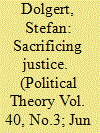| Srl | Item |
| 1 |
ID:
113827


|
|
|
|
|
| Publication |
2012.
|
| Summary/Abstract |
Democratic theorists have increasingly turned to Aeschylus' Oresteia as a resource for challenging the shortcomings of liberal theory, but I argue that this particular return to Greek tragedy should be treated with a healthy dose of skepticism. Defenders of Aeschylean justice have underplayed the sacrificial aspects of his solution to the problem of civil strife, mistaking the consent of the Furies for a resolution that escapes the cycle of violence. Drawing on elements of Greek ritual practice, I contend that Aeschylus folds the consent of the Furies into a sacrificial framework which denies the violence it enacts by directing this violence toward nonhumans. As a consequence Aeschylean justice is complicit in continuing the sacrificial economy it seems to subvert, and Aeschylean politics relies on the suffering of nonhumans (and humans) to secure its conception of order.
|
|
|
|
|
|
|
|
|
|
|
|
|
|
|
|
| 2 |
ID:
113303


|
|
|
|
|
| Publication |
2012.
|
| Summary/Abstract |
Most of our knowledge of the Peloponnesian War comes from the text of Thucydides' History, yet IR scholars are strangely credulous when evaluating Thucydides' pronouncements. I explore what Thucydides does not tell us, and suggest that his text obscures important information regarding the outbreak of the war. Thucydides has a secular bias which leads him to discount the Spartan religious self-narrative, but by attending to this schema, in which Sparta sees itself in the role of the pious defender of moderation pitted against the corrupt Athenians, we gain a richer understanding of the chain of events that led to war. Contemporary scholars have too readily adopted Thucydides' perspective on this issue, but by assessing Thucydides' data using insights drawn from contemporary cognitive theories of narrative and image we see that misperceptions based in the conflicting Athenian and Spartan narratives played an important role in the escalation of the crisis.
|
|
|
|
|
|
|
|
|
|
|
|
|
|
|
|